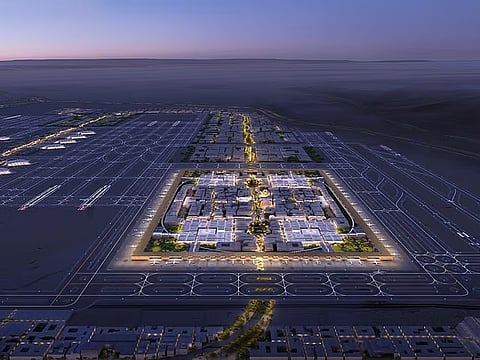Saudi Arabia to build new 40-million-passenger terminal at King Salman International Airport
The new terminal is designed to support Riyadh’s rise as a global aviation hub

Dubai: Saudi Arabia is moving ahead with major expansion plans for King Salman International Airport (KSIA), with work set to begin next year on a new passenger terminal capable of accommodating 40 million travellers annually.
In a statement to Al Eqtisadiah Arabic daily newspaper, KSIA's acting CEO Marco Mejia said that the new terminal forms part of Riyadh’s ambitious strategy to transform the King Salman Airport into one of the world’s largest aviation hubs. The megaproject, which will eventually replace King Khalid International Airport, is central to the Kingdom’s ongoing efforts to position Riyadh as a global gateway for business, tourism and logistics.
Mejia confirmed that the next phase of development will also include new aircraft hangars and key airside infrastructure, with construction scheduled to start in 2026. The airport aims to begin operations in 2029, representing a major milestone in Saudi Arabia’s aviation expansion under Vision 2030.
He made the remarks during KSIA’s inaugural Partners Forum, where four memorandums of understanding were signed with leading national entities, including the Saudi Data and Artificial Intelligence Authority (SDAIA), TASAMA, Elm, and Cluster2. These agreements form part of a broader strategy to reinforce strategic partnerships and support the airport’s upcoming development phases.
The forum brought together senior figures from government bodies, private-sector organisations, and international aviation and logistics experts, underscoring both the national significance of the project and its alignment with Vision 2030’s transformation agenda.
KSIA’s ambitious masterplan includes a six-runway mega-hub capable of accommodating up to 120 million passengers annually by 2030, rising to 185 million by 2050. The airport is also expected to become the future home of Riyadh Air, the Kingdom’s new national carrier, and serve as a major catalyst for economic diversification through enhanced connectivity, expanded cargo capacity and increased tourism flows.
The addition of a 40-million-passenger terminal in the initial phase highlights the scale and pace of Saudi Arabia’s aviation investment as the Kingdom accelerates infrastructure development to boost Riyadh’s global competitiveness and meet rising regional and international travel demand.
During the forum, KSIA showcased key assets of the project, including advanced facilities, development blueprints and architectural models, giving attendees a comprehensive insight into the airport’s design and progress to date.
The KSIA Partners Forum concluded its first edition with a shared commitment among all participating organisations to continue driving the development of this landmark project and work collectively towards making King Salman International Airport one of the world’s largest and most advanced aviation hubs.
Sign up for the Daily Briefing
Get the latest news and updates straight to your inbox



